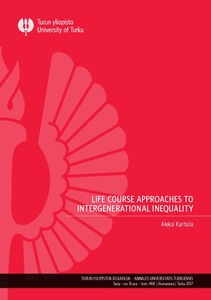Life course approaches to intergenerational inequality
Karhula, Aleksi (2017-12-15)
Life course approaches to intergenerational inequality
Karhula, Aleksi
(15.12.2017)
Turun yliopisto
Julkaisun pysyvä osoite on:
https://urn.fi/URN:ISBN:978-951-29-7075-9
https://urn.fi/URN:ISBN:978-951-29-7075-9
Kuvaus
ei tietoa saavutettavuudesta
Tiivistelmä
This dissertation examines intergenerational inequalities from a life course perspective. Different outcomes and paths to outcomes are analyzed using register data. The thesis consists of four research articles and a conclusion.
Intergenerational inequality is one of the most researched subjects in sociological literature. We know that family background impacts practically every major decision and event in a person’s life. Even in the Finnish context of an extensive welfare state, we can only mitigate intergenerational inequality, not eliminate it. One could say that parents’ will and ability to transmit advantages to their children to different extents is almost as fundamental as the inevitable inequality in societies and social systems.
In this dissertation, the transmission of inequalities is studied from the life course perspective over many outcomes. The aim is to provide a comprehensive and holistic picture of intergenerational transmissions. Outcomes range from more traditional educational and economic ones to family formation patterns and homeownership. In all cases, family background has a clear impact.
Two register-based data sets from Statistics Finland are used in the articles (Finnish Growth Environment Panel and Finnish Census Panel). Both include information on the siblings and parents of the sample persons. Because they are register based, the data sets are comprehensive and reliable. We not only can match people with their relatives but also have detailed information on siblings and parents with respect to studied phenomena and background information.
In the first article, we established that early day care is associated with higher educational outcomes in early adulthood. We did not find any parental education-based variation in the strength of the association. In the second article, we found that early socioeconomic trajectories are influenced by family background. Although parental education and income in one’s childhood family are leading determinants of intergenerational transmissions, a large share of the family background effect remains unexplained. Furthermore, we show that only about half of the family of origin effect on early socioeconomic trajectories is associated with the end outcomes at age 35. Therefore, family background has a clear effect on early socioeconomic trajectories that could not be observed by analyzing the end outcomes. In the third article, we found that family formation trajectories are affected by family background, disadvantaged paths the most. We could not identify a large share of the family background determinants underlying the effects. In the last article, which analyzes homeownership, we found a strong overall effect of family background in the form of sibling correlations. We also found that for men, the effect varied between those living with or without a partner. The strongest sibling correlations were found for men living alone. Overall, social origin broadly influenced many aspects of a person’s life course.
Intergenerational inequality is one of the most researched subjects in sociological literature. We know that family background impacts practically every major decision and event in a person’s life. Even in the Finnish context of an extensive welfare state, we can only mitigate intergenerational inequality, not eliminate it. One could say that parents’ will and ability to transmit advantages to their children to different extents is almost as fundamental as the inevitable inequality in societies and social systems.
In this dissertation, the transmission of inequalities is studied from the life course perspective over many outcomes. The aim is to provide a comprehensive and holistic picture of intergenerational transmissions. Outcomes range from more traditional educational and economic ones to family formation patterns and homeownership. In all cases, family background has a clear impact.
Two register-based data sets from Statistics Finland are used in the articles (Finnish Growth Environment Panel and Finnish Census Panel). Both include information on the siblings and parents of the sample persons. Because they are register based, the data sets are comprehensive and reliable. We not only can match people with their relatives but also have detailed information on siblings and parents with respect to studied phenomena and background information.
In the first article, we established that early day care is associated with higher educational outcomes in early adulthood. We did not find any parental education-based variation in the strength of the association. In the second article, we found that early socioeconomic trajectories are influenced by family background. Although parental education and income in one’s childhood family are leading determinants of intergenerational transmissions, a large share of the family background effect remains unexplained. Furthermore, we show that only about half of the family of origin effect on early socioeconomic trajectories is associated with the end outcomes at age 35. Therefore, family background has a clear effect on early socioeconomic trajectories that could not be observed by analyzing the end outcomes. In the third article, we found that family formation trajectories are affected by family background, disadvantaged paths the most. We could not identify a large share of the family background determinants underlying the effects. In the last article, which analyzes homeownership, we found a strong overall effect of family background in the form of sibling correlations. We also found that for men, the effect varied between those living with or without a partner. The strongest sibling correlations were found for men living alone. Overall, social origin broadly influenced many aspects of a person’s life course.
Kokoelmat
- Väitöskirjat [3105]
